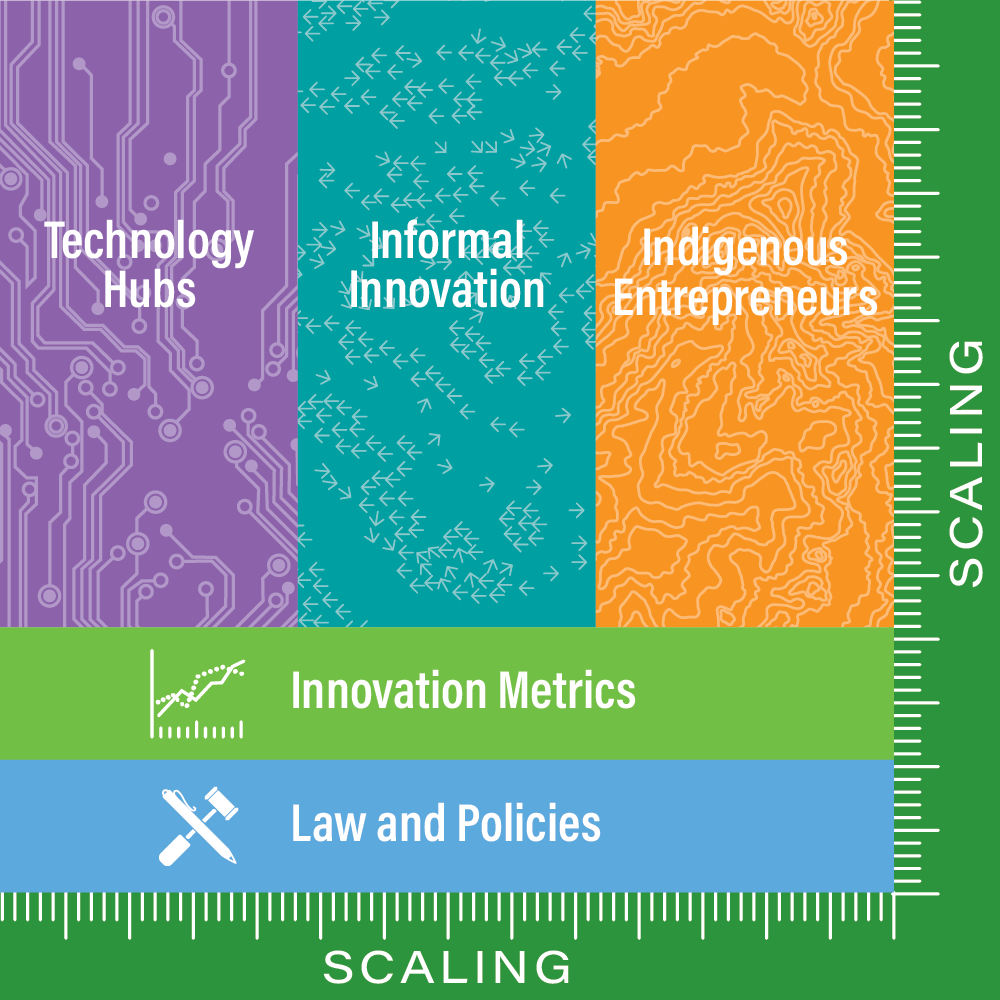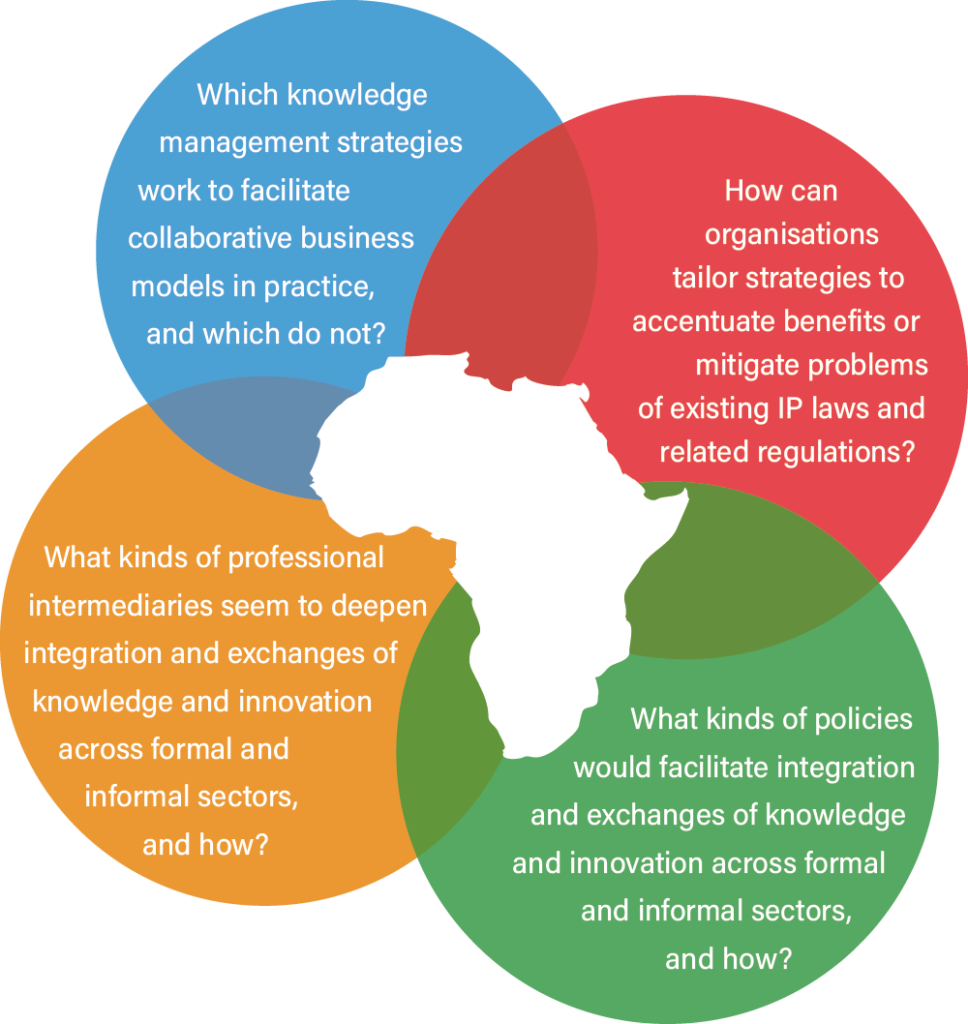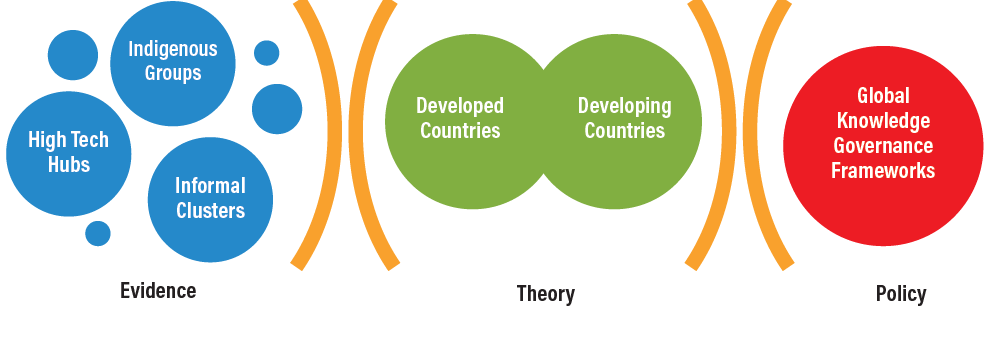Open AIR is a unique collaborative network of researchers spread across 22 African countries, Canada, and elsewhere in the world, answering two overarching questions:
- How can open collaborative innovation help knowledge-based businesses scale up and seize the new opportunities of a global knowledge economy?
- Which knowledge governance policies will best insure that the social and economic benefits of innovation are shared inclusively?
Open AIR’s primary goal is to uncover new insights about the balance between control over and access to knowledge. We aim to solve a problem at the heart of intellectual property (IP) and innovation policy: how to reconcile tensions between appropriation and access, excluding and sharing, and competing and collaborating. Our research is showing how knowledge-based businesses can capitalise on open collaborative innovation strategies.
Open AIR’s African-centered research calls attention to the importance and sensitivity of context in the making of IP and knowledge governance policy for sustainable development. Through improved IP policies and practices, this research will lead to more innovation that benefits more people in both developing and developed countries.
Open AIR is bringing insights and perspectives to the rest of the world, learning from what is happening and what works in Africa.
To learn from Africa, Open AIR is building partnerships with leading experts, institutions and funding organizations from Canada. To prepare for plausible futures in which knowledge-based innovation becomes more prominent in Africa, Open AIR is connecting new and emerging researchers in African countries with their counterparts in places such as Canada. Through mutually beneficial research partnerships, Open AIR is recognizing Africa’s role in the global knowledge economy.
Leveraging our social capital and connections to key decision makers. For example, through our now well-established reputation and networks, we have been able to connect with key decision makers from international organizations, national governments, and leading scholarly and activist associations.
The Research Problem
The Open AIR network’s research during the past decade shows that innovation is happening in Africa in ways that were previously overlooked.
Our research also shows that the role of intellectual property is more nuanced than often portrayed. It can sometimes facilitate or frustrate innovation, or even both. Recently, we have focused on the scalability of open and collaborative business models.
Our research has also created a unique interdisciplinary community of established and emerging African researchers. Our joint activities improved research quality and capacity, adding credible, independent, and distinctly African voices to global policy debates. We are leveraging our social capital to influence policies and practices, and to position African leaders centrally in global networks.
Based on many African nations’ recent records of strong economic growth and shifting demographic trends, businesses on the continent are emerging as important players in the global knowledge economy. Yet, if Africa’s tremendous potential for global economic and trade opportunities is to be realised, many issues must be overcome. One of these issues – the focus of Open AIR’s current research – is learning how to scale up knowledge-based businesses without jeopardising sustainability or sacrificing core values. Our hypothesis has been that business models grounded in networked, open, and collaborative innovation can help make that happen.
Parallel to empirical research in African countries, we have been conducting comparable research in the global North. Cross-regional comparative research has revealed commonalities and contrasts that can be used to improve governance of the global knowledge economy for the benefit of people living in developed and developing countries alike.
Research Clusters
Open AIR’s landmark foresight study, Knowledge and Innovation in Africa: Scenarios for the Future, identified plausible scenarios for the future of knowledge and innovation.
This showed three areas that are local priorities, especially for marginalised communities, and formed the basis of where our research should lead and where there are gaps in understanding. The research we have been conducting now aims to dig more deeply into particular dimensions of these scenarios, specifically regarding the ways that scalable open and collaborative innovation can help scale business models and the impact of next-generation technologies to promote inclusion.
Open AIR has five thematic research clusters, based on our previous research on knowledge and innovation in Africa: High Technology Hubs; Informal Innovation; Indigenous Entrepreneurship; Innovation Metrics, and Laws and Policies.

Refocussed research to remain at the cutting edge of emerging problems
- How can open collaborative innovation help scale the impacts of next-generation technologies to promote gender equality, youth employment, and other aspects of inclusion?
Following our midterm review, we have refined our research agenda to shed new light on a core research questions:
In order to promote scalable African innovation that is inclusive, policymakers and practitioners need new research on the intersections amongst innovation and two specific subtopics (a) gender equality and empowerment of women and girls, and (b) African economic integration and international law and trade policy. These are not the only issues to solve, obviously, but both topics have emerged in response to real-time priorities of African policymakers, and indeed many stakeholders across the global innovation system.
Economic Integration, International Law, and Trade Policy
The African Continental Free Trade Area, AfCFTA, is a potential game-changer for intra-African trade, economic integration, law, and IP policy. While free trade in goods is the immediate priority, the aim is eventually for significant labour mobility and even a common currency. Research to solve problems associated with economic integration and trade policy are intended to be responsive to these real-time policy impact opportunities on the continent. To assist trade policymakers in the development of a framework, we are exploring IP issues, perspectives, and priorities. Further research will show how process and substance issues are both important to create fair and balanced IP systems on the continent that stimulate innovation, growth, and competition.
Gender Equality and Empowerment of Women and Girls
Our emerging emphasis on gender is, most fundamentally, a matter of women’s rights as human rights. We know that women are as innovative as men but must overcome systemic barriers to the protection and adoption of women-led innovation. Our research investigates whether and, if so, how innovation frameworks not only ignore the disproportionate effects that laws, policies, and practices have on women, but also project male-dominated perspectives on ownership and compensation. Innovation policies are, unfortunately, even less likely to consider the perspectives of intersectional marginalized groups, such as poor, racialized women in developing countries. For example, we are exploring the relevance and practical uptake of various aspects of ICTs as tools to advance the participation of women in economic development, wealth creation and ultimately poverty alleviation.
Artificial Intelligence
Monumental advances in technology are impacting human lives, including in Africa. Fourth industrial revolution (4IR) technologies, data, and artificial intelligence (AI) feature prominently in initiatives conducted at Open AIR hubs across Africa and in Canada. An array of activities, including research, teaching and outreach related to 4IR and AI are taking place at our different hubs. Each of these activities tie directly or indirectly, to Open AIR’s goal of creating explorative knowledge of the developmental implications of AI, specifically in Africa. Through thematic research on high technology hubs, informal innovation, and indigenous entrepreneurship in Africa, Open AIR is taking steps toward advancing an emerging research agenda on AI for development. With this research, we are tackling questions related to AI and gender equality, AI’s future impacts on youth employment, and the inclusion of marginalized communities in African AI policies.
Maker Movement
Since 2016, Open AIR has intensively researched the work of maker communities in African countries and in Canada. Through our use of grounded and action research techniques, these maker communities are not only research subjects but also collaborators in our research. Open AIR is one of the pioneers in this research area in developing-world contexts. This is because we see the maker movement as a key manifestation of, and potential future driver for, open, collaborative innovation and livelihood development in Africa.
Between 2016 and 2018, Open AIR conducted studies of innovation, collaboration, knowledge governance, and enterprise-scaling by maker communities in South Africa, Kenya, Egypt, Tunisia, and Morocco. Additionally, our research into activities at the Suame Magazine informal-sector cluster in Ghana considered potential linkages to the maker movement. Also, in mid-2016 Open AIR convened a Canadian maker movement research meeting at the University of Ottawa. And in 2017, we jointly convened, with the South Africa Maker Collective, a national workshop of South African makers in Pretoria. We also presented at the 2017 and 2018 Ontario Makers and Mentors Innovation Conference (OMMIC) events hosted by the University of Ottawa.
In 2018-19, we deepened both our research and our level of engagement with maker communities. We collected interview data from maker communities in three additional African countries (Senegal, Burkina Faso, Cameroon), we broadened our South African research to include a focus on maker communities and “socio-economic inclusion”, and we conducted interviews with participants in 16 Ontario maker communities.
Open AIR also helped fund, and participated in, two African continental gatherings of makers: the Africa Open Science and Hardware (AfricaOSH) summits in Kumasi, Ghana (2018), and Dar es Salaam, Tanzania (2019). At those summits, Open AIR broadened its networking with the African maker movement, forming links with additional maker communities across the continent. Valuable linkages were also forged at those summits with makers in Brazil, the US, the UK, France, and Germany, as well as with international networks such as the Gathering for Open Science Hardware (GOSH), MakerNet Alliance, and Global Innovation Gathering (GIG).
Open AIR is devoting early 2021 to completion of analysis of the 2018-19 data collections in Senegal, Burkina Faso, Cameroon, South Africa, and Canada, and we have committed to helping fund and convene the next two AfricaOSH summits, in Yaoundé and then in Johannesburg. at those two summits, Open AIR hopes to spearhead a continent-wide collaboration with African maker communities, networks, and researchers to develop a set of open access online resources under the working title of “Sustainability Guidelines and Best Practices for African Maker Communities”.
Questions and Methods
Across the research clusters we are investigating several sub-questions.

- Which knowledge management strategies work to facilitate collaborative business models in practice and which do not?
- How can organisations tailor strategies to accentuate benefits or mitigate problems of existing IP laws and related regulations?
- What kinds of policies would facilitate integration and exchanges of knowledge and innovation across formal and informal sectors, and how?
- What kinds of professional intermediaries seem to deepen integration and exchanges of knowledge and innovation across formal and informal sectors, and how?
Open AIR’s response to the problems and questions described above is to seek solutions based on robust, empirical, grounded research. In pursuit of ensuring that our research has an impact, the methods are split into three phases – empirical evidence, grounded theory building, and designing and promoting coherent regional and global knowledge governance frameworks, exerting policy and practical influence through scenario-driven strategies, and feedback to our case study subjects.

Putting Research into Practice
There are five parts to Open AIR’s strategy for mobilizing research insights into practical outcomes. In our first three years, we have had extraordinary success on all aspects of our strategy:

Leveraging our social capital and connections to key decision makers. For example, through our now well-established reputation and networks, we have been able to connect with key decision makers from international organizations, national governments, and leading scholarly and activist associations.

Engaging stakeholders early and often in the research process to ensure relevance. We are working directly with the beneficiaries of our research through our participatory action techniques in, for instance, the areas of high tech hubs, makerspaces, and indigenous communities.

Publishing open access, bilingual scholarship and practical policy materials. We have created a new working paper series, translated key outputs from previous research into French, and are now “versioning” our materials into briefing notes, handbooks, toolkits, and scholarly articles.

Amplifying our influence through social media and mainstream press communications. Our website has become an increasingly key vehicle for disseminating Open AIR research results and our expanded social media presence continues to create interest around our work.

Empowering new scholars to understand and share insights in their future endeavours. Our “new and emerging researchers group” is thriving, with more than 90 current members and alumni. All of our hubs have teams of research assistants training to become future leaders.




